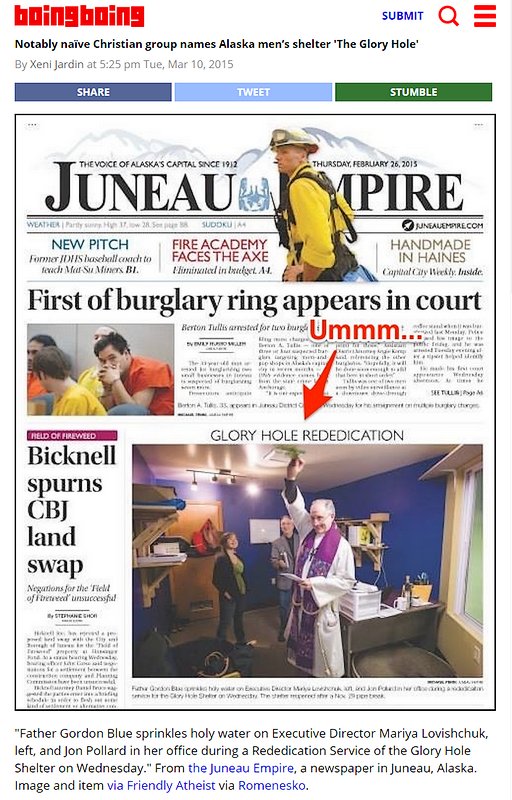What’s In A Glory Hole?
Wednesday, March 11th, 2015 -- by Bacchus

It’s right there in Wikipedia: A glory hole is “a surface depression produced by block caving in underground mining.” Which is to say: you dig a lot of ore out of an underground mine, and eventually the roof falls in. You get a glory hole, a big dangerous crumbling conical pit. If you fall into a glory hole, you don’t come out again.

Nobody seems to know just when this mining term originated, but it was in standard use (albeit inside scare quotes to indicate slang) by the time The Colliery Engineer wrote about the Treadwell Mine near Juneau, Alaska, in 1904:
(Click photo or here for article.)
In mining towns back in the day, a down-on-his-luck miner or a terrible public drunk (often the same individual) was said to be “down the glory hole.” A big hole you fall into and can’t ever hope to get out of again? It seems a reasonable analogy to alcoholism and despair.
Fast forward to sometime in the 1940s. Again nobody seems to know the details, but according to the Online Etymology Dictionary, a sexual connotation to the phrase “glory hole” arose in the gay community. You loyal ErosBlog readers know this meaning:
Press the fast forward button again. Now it’s 1981. The Juneau Cooperative Christian Ministry opens a soup kitchen and homeless shelter for local indigents and drunks. Their mission?
In response to God’s commandment to love our neighbors as ourselves, the mission of The Glory Hole is to provide food, shelter and compassion to achieve physical and spiritual well-being for those most in need.
That’s from their website. They’re good folks. There’s a vegetable garden on their roof. They rely on donations. (The PayPal button is on their page.) People of all faiths, or no faith at all, volunteer for them and support their fundraisers. All this info is on their website or in Google, not buried very deep.
Back in 1981, yes they did go there: they named their new soup kitchen “The Glory Hole.” It was a nod to local history and tradition, with the collapsed mines and the people who had metaphorically fallen in. Did they know about gay sexual slang, these charitable Christian people, back in 1981, in that little town with no roads going in or out, before the internet, before the cruise ships started bringing five million visitors a year? Would they have cared if they did know? Or would they have laughed it off as an irrelevant oddity of far-distant urbanites?
Fast forward again to 2015. There’s a re-dedication ceremony for the soup kitchen and shelter. Ostentatious ceremonial praying is involved, because that’s how religion is done. A photograph of the ceremony makes the front page of the local paper. (It’s still a small town where, apparently, not much happens.)
But this is the 21st century, full of net-savvy hipsters aware of all internet traditions as well as everything that’s on Urban Dictionary. If it clickbaits, it leads. Truth? Reportage? Journalism? 30 seconds of Googling? Nah, why bother! Scoffing is funner!
And that’s how you get a thing like this at a place like Boing Boing:

Look at that smug headline again:
Notably naïve Christian group names Alaska men’s shelter “The Glory Hole”
Of course The Glory Hole in Juneau is not actually a men’s shelter, it’s open to people regardless of gender, which destroys the biggest part of the joke. (Xeni Jardin at Boing Boing grabbed that wrong detail, obviously without checking the charity’s website, from one of her credited sources, while grabbing the graphic from the other one.)
And about the naming of the place? It’s right there in the photo caption: the story is about the charity’s rededication, not its founding. The facility was set up and named back in 1981 (a fact that’s also on the website). So the newspaper story isn’t even about what the Boing Boing headline claims it’s about. Was it in fact “notably naïve” to name a soup kitchen after a strong local cultural tradition in 1981 in a town of less than 20,000 residents that was 1500 miles from San Francisco? I guess that’s a matter of opinion. But small town naiveté in 1981 wouldn’t be funny clickbait, would it? Nope, this will go viral a lot faster if you pretend the naïve act of naming happened in 2015. So let’s go with that, shall we? Hit the publish button! Viral viral viral!
Bloggers are generally not journalists. I don’t aspire to that standard, which is a good thing, because I can’t live up to it. Xeni Jardin, however, does claim to be a “tech culture journalist.” I guess “tech culture journalist” means never having to click through and check the website of the people you are making fun of. In order to find out if they are actually, you know, risible?
Update: Since publication of this post, BoingBoing has modified their item by adding this paragraph, including a direct link to the charity in question, to the bottom of Xeni’s post:
They do good work. They feed and provide shelter to the hungry and homeless. After you finish laughing, consider donating.
Similar Sex Blogging:









